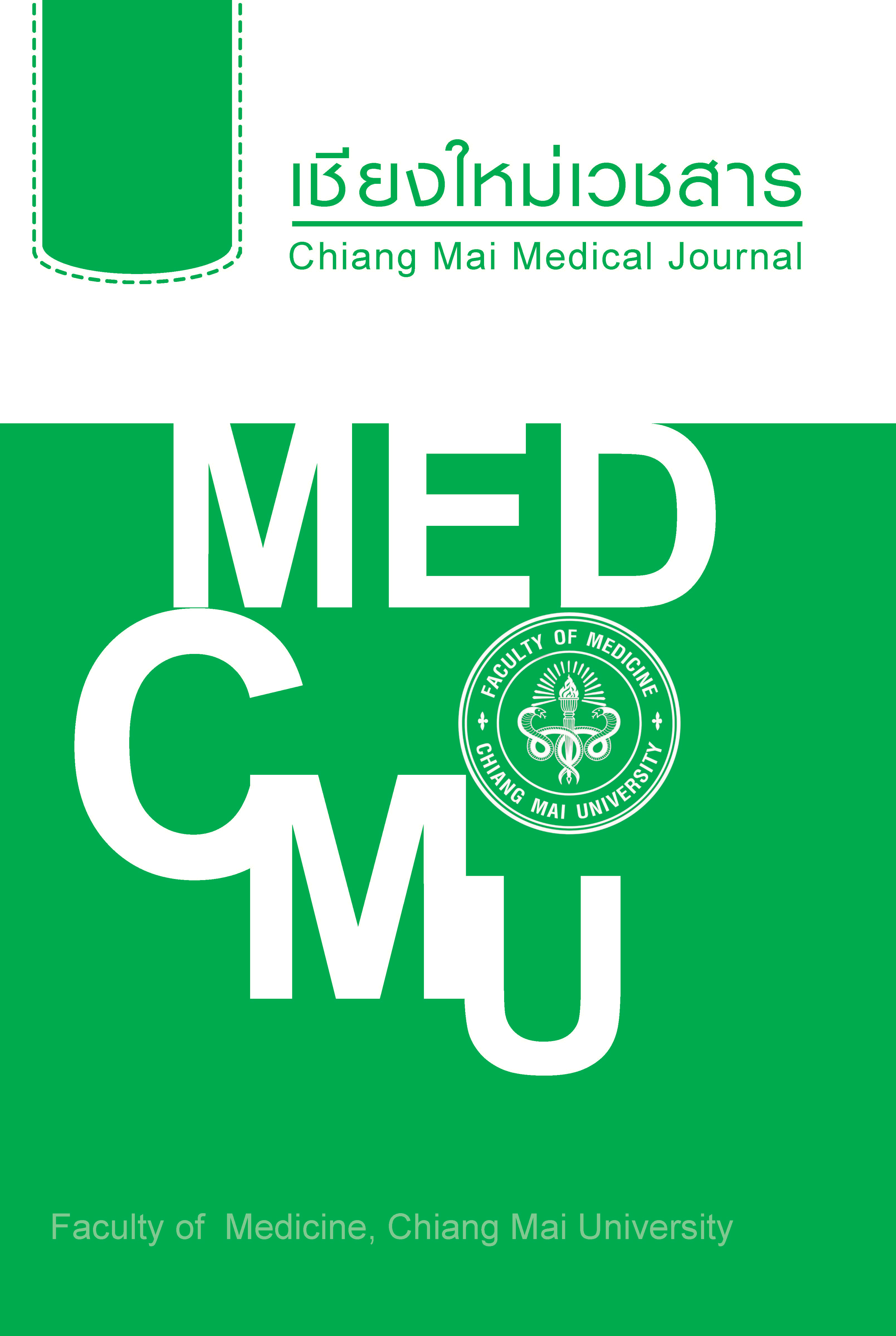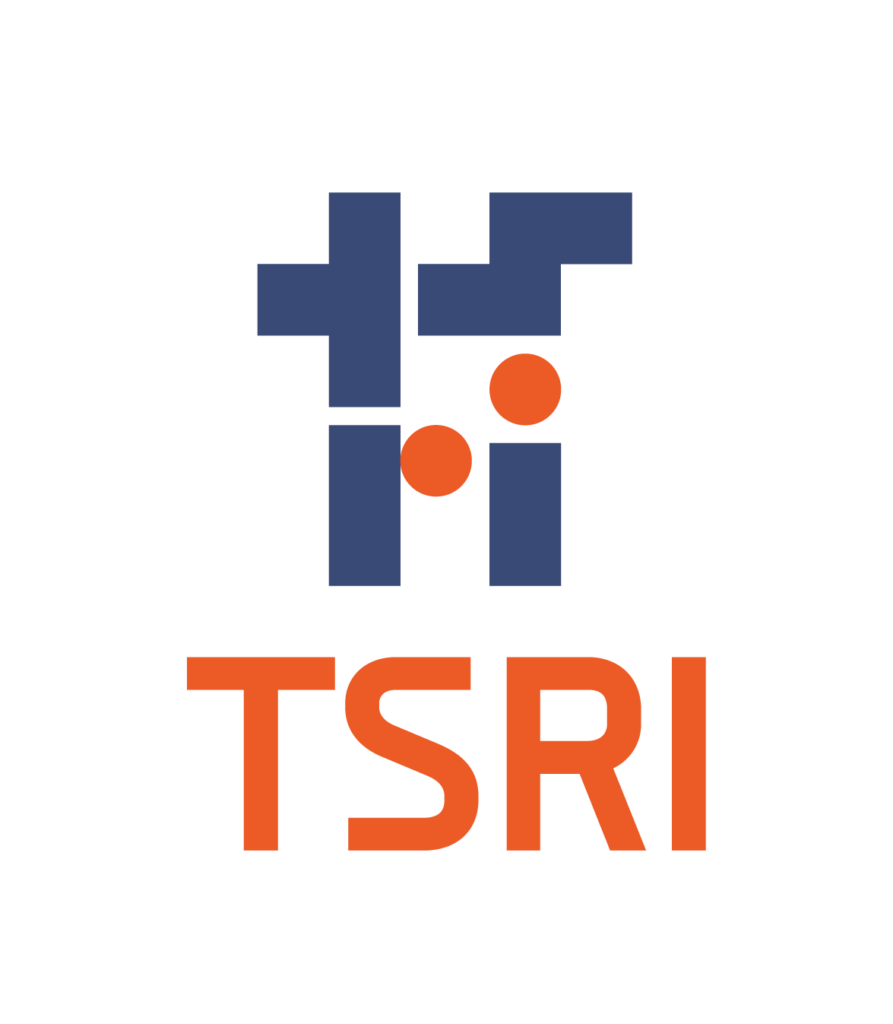Comparison of helical tomotherapy treatment plan verification using ionization chamber, film and two-dimensional ionization chamber array
Keywords:
tomotherapy, absorbed dose, relative dose, Octavius, gamma indexAbstract
Objective To evaluate the performance of ionization chamber, film and two-dimensional ionization chamber array used for the helical tomotherapy treatment plans verification.
Methods The treatment plan of thirteen patients who were treated on Helical Tomotherapy in Division of Therapeutic Radiology and Oncology, Faculty of Medicine, Chiang Mai University were used to verify in this study. The verification point dose were measured by an ionization chamber and Octavius 2D array. The dose distribution were measured by
film and Octavius 2D array. The point dose and dose distribution were compared using the percentage dose difference and gamma index passing rate, respectively.
Results The treatment plan verification based on absorbed point dose measurement using ionization chamber and Octavius 2D array demonstrated the root mean square of the percentage dose difference obtained from measured values in comparison to calculation were 0.38 and 0.84 for ionization chamber and Octavius 2D array, respectively. For
the relative dose distribution, the average of the percentage gamma index passing rate with 3% /3mm and the standard deviation of the film and Octavius were 86.59±11.81 and 96.39±6.79, respectively.
Conclusion The point absorbed and relative doses verification by ionization chamber, film and Cheese phantom with a standard method are accurate and effective. The point absorbed and relative doses verification by Octavius detector and Octavius phantom are accurate and effective for the helical tomotherapy treatment plan.
References
Alber M, Broggi S, Wagter CD, et al. ESTRO Booklet No. 9: Guldelines for The Verifi cation of IMRT, Mounierlaan 83/12–1200 Brussels (Bel-gium). First edition. 2008.
Klein E, Hanley J, Bayouth J, et al. American Association of Physicists in Medicine Task Group Report 142. Am Assoc Phys Med 2009;36:4197-212.
Arno JM, John CR. Intensity modulated radia-tion therapy: A clinical perspective. BC Decker Inc Hamilton. London. 2005.
Podgosak EB, Alfonso R, Rajan G et al. Radia-tion Oncology Physics: a handbook for teachers and students. International Atomic Energy Agen-cy. Vienna. 2005.
Depuydt T, Van Esch A, Huyskens DP. A quan-titative evaluation of IMRT dose distributions: re-fi nement and clinical assessment of the gamma evaluation. Radiotherapy and Oncology 2002; 62:309–19.
Utitsarn K, Suriyapee S, Oonsiri S, Oonsiri P.Dosimetric verifi cation using 2D planar diode arrays and 3D cylindrical diode arrays in IMRT and VMAT. Thai Medical Physicist Society and Faculty of Allied Health Sciences 2012; 69-72.
www.ptw.de [homepage on the Internet]. OC-TAVIUS II IMRT Pre-Treatment QA. [update 2013 April 15]. Available from: http://www.ptw.de/oc-tavius_ 2.html?&cId=5599.
Chandraraj V, Stathakis S, Manickam R, Esquiv-el C, Supe SS, Papanikolaou N. Comparison of four commercial devices for RapidArc and slid-ing window IMRT QA. Journal of Applied Clinical Medical Physics, Spring 2011;12:338-49.
Esch AV, Clermont C, Devillers M, Iori M, Huyskens DP. On-line quality assurance of rota-tional radiotherapy treatment delivery by means of a 2D ion chamber array and the Octavius phan-tomm. Am Assoc Phys Med Oct 2007;34:3825-37.
Xu S, Xie C, Ju Z, et al. Dose verifi cation of heli-cal tomotherapy intensity modulated radiation therapy planning using 2D-array ion chambers. Biomedical Imaging and Intervention Journal 2010; 6:1-9.
Chandraraj V, Ravikumar M, Sathiyan S, Supe SS, Vivek TR, Manikandan A. Dosimetric veri-fi cation of brain and head and neck intensity-modulated radiation therapy treatment using EDR2 fi lms and 2D ion chamber array matrix. J Cancer Res Ther, 2010;6:179-84.
Downloads
Published
How to Cite
Issue
Section
License
Copyright (c) 2017 เชียงใหม่เวชสาร (Chiang Mai Medical Journal)

This work is licensed under a Creative Commons Attribution 4.0 International License.










